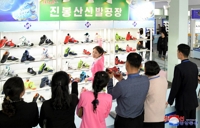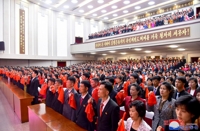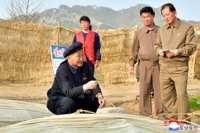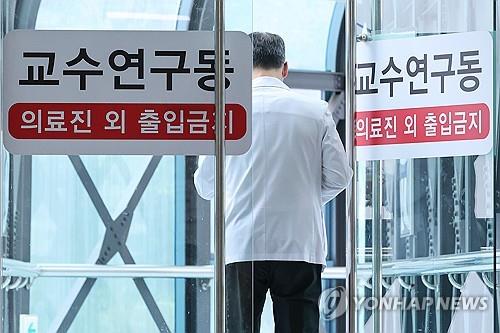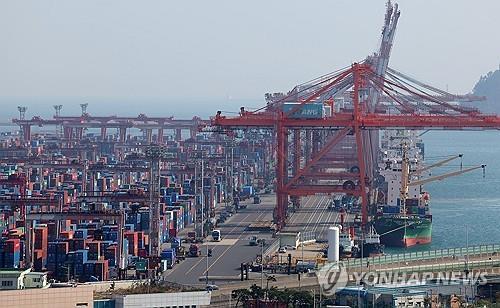Hyundai committed to expanding diesel car lineup: executives
SEOUL, Oct. 30 (Yonhap) -- Hyundai Motor Co., South Korea's largest carmaker, is committed to expanding its diesel lineup to include premium sedans like the Genesis so as to meet growing demand for more fuel-efficient cars and comply with tougher greenhouse emission standards, its top executives said Thursday.
Kim Choong-ho, the company's president, said that Hyundai wants to diversify its powertrains to include more diesels, hybrids and pure electric cars.
He stressed that diesel models of the Aslan front-wheel drive flagship sedan launched earlier in the day and seventh-generation Sonata are planned for release in the not too distant future. He stressed that such a development should give consumers at home and abroad more choices.
The move, if pursued vigorously, could help Hyundai make a bigger splash in the diesel vehicle arena, especially in places like Europe, India and other developing economies. The company has been struggling to maintain market share in Europe, in part because it offers a limited number of diesel-powered vehicles.
Most of Hyundai's diesel offerings are minis and superminis, along with some subcompact cars. Only its i40, designed in Europe, is a midsize car with a diesel engine, but its sales have not met expectations. It recently launched a Grandeur diesel, but that car is only sold in its home market.
The carmaker, like U.S. and Japanese automakers had in the past, generally neglected diesels that were prone to vibration, were noisy and smelly, and focused on smooth-running gasoline motors. This stance, however, has become a source of concern in the face of tougher regulatory rules on carbon dioxide (CO2) released into the atmosphere, and demand for better mileage from consumers.
In particular, the success of European cars with diesel engines that get about 20 percent better range than gasoline mills has been an eye-opener for local original equipment manufacturers in recent years.
So far into 2014, imports, led by European carmakers like BMW, Audi, Mercedes-Benz and Volkswagen have accounted for 14.1 percent of all new cars sold in the country, with some predicting that at the present pace, their market share will reach up to 27 percent.
Kim Sang-dae, director of Hyundai's marketing division, was straightforward and said diesel engines are one of the few ways carmakers can reduce greenhouse emission levels.
He then said that while no decision has been made, the carmaker is seriously considering a diesel motor for its very popular Genesis premium sedan.
"The move is being reviewed in earnest," the executive confirmed, although making clear it is too early to say when such a vehicle will reach consumers.
Industry insiders said that while Hyundai has not concentrated on diesels as their European rivals have done, it does have engines that could be used on the Sonata and Aslan.
"As can be seen by the very smooth-running Grandeur diesel, Hyundai seems to have made strides in coping with the worst characteristics of diesels, which are noise and vibration," a local observer said.
He said that because the Aslan shares the same platform as the Grandeur, it may be possible to use the R2.2-liter diesel engine that could speed up development and cut production costs. For the Sonata, the 1.7L diesel belonging to the U engine family could be used with the right modifications.
In regards to the Genesis, which is a much larger car and uses rear-wheel drive architecture, experts speculated that Hyundai may opt for the V6 3L S-line engine used on the Mohave full-size SUV made by its corporate cousin, Kia Motors Corp. On the other hand, the company could opt to make a whole new family of engines for upscale cars, which could allow it to compete with its vaunted German rivals that made extensive use of diesels and turbos to equip even large luxury sedans.
"Everything will depend on the performance of existing engines and whether or not they can be made for a car like the Genesis, but it seems clear Hyundai wants to expand its diesel lineup," said another car industry watcher who has been following the carmaker.
yonngong@yna.co.kr
(END)
-
 S. Korea marks 30th anniv. of Korean Pavilion at Venice Biennale with contemporary art
S. Korea marks 30th anniv. of Korean Pavilion at Venice Biennale with contemporary art -
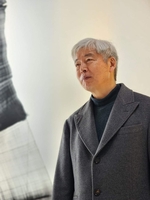 Artist Lee Bae captures ethereal Korean aesthetics at Venice Biennale
Artist Lee Bae captures ethereal Korean aesthetics at Venice Biennale -
 Ateez member Yunho throws first pitch at MLB match between Dodgers, Mets
Ateez member Yunho throws first pitch at MLB match between Dodgers, Mets -
 Gov't likely to accept university chiefs' request to lower med school enrollment quota
Gov't likely to accept university chiefs' request to lower med school enrollment quota -
 S. Korea supports resolution backing U.N. membership of Palestine
S. Korea supports resolution backing U.N. membership of Palestine
-
 Artist Lee Bae captures ethereal Korean aesthetics at Venice Biennale
Artist Lee Bae captures ethereal Korean aesthetics at Venice Biennale -
 S. Korea marks 30th anniv. of Korean Pavilion at Venice Biennale with contemporary art
S. Korea marks 30th anniv. of Korean Pavilion at Venice Biennale with contemporary art -
 Gov't likely to accept university chiefs' request to lower med school enrollment quota
Gov't likely to accept university chiefs' request to lower med school enrollment quota -
 Looming weekly closure of major hospitals feared to worsen medical service crisis
Looming weekly closure of major hospitals feared to worsen medical service crisis -
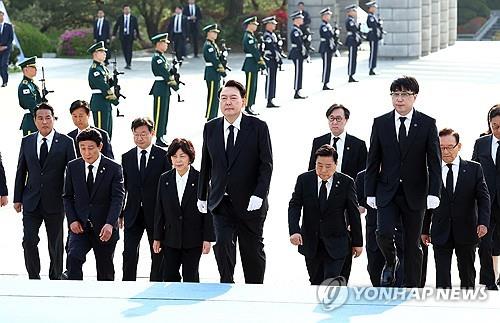 Yoon's approval rating sinks to lowest point since taking office
Yoon's approval rating sinks to lowest point since taking office
-
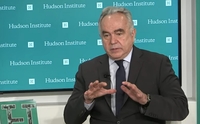 U.S. will take steps for three-way engagement on nuclear deterrence with S. Korea, Japan: Campbell
U.S. will take steps for three-way engagement on nuclear deterrence with S. Korea, Japan: Campbell -
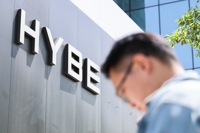 (LEAD) Hybe to file complaint against sublabel executives over internal conflict
(LEAD) Hybe to file complaint against sublabel executives over internal conflict -
 Looming weekly closure of major hospitals feared to worsen medical service crisis
Looming weekly closure of major hospitals feared to worsen medical service crisis -
 S. Korea reports highest suicide rate, ultra fine dust level among OECD nations: data
S. Korea reports highest suicide rate, ultra fine dust level among OECD nations: data -
 Author of ADOR's 'internal document' refutes allegations of spinoff plot
Author of ADOR's 'internal document' refutes allegations of spinoff plot















